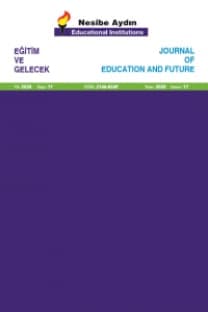Opinions of Academic Administrators Regarding Constructing a Quality Culture at Education Faculties
Teacher quality is
directly related to the quality of education. It is important that teacher
candidates be very well equipped at pre-service period as well as be followed
during in service period. The aim of teacher education is to equip student
teachers with knowledge, skills and attitudes regarding the teaching profession.
In this context, it is important to construct a quality culture at education
faculties to improve the quality. In this study, one dimension of a
multidimensional study on internal quality standards was focused on. This study
was based on a mixed methods design. While quantitative data gathering
techniques (document analysis) were used to determine the current quality
policies at education faculties, qualitative data gathering techniques
(interview) were used to determine the suggestions regarding applications to
foster a quality culture of academic administrators (deans, vice deans and
department chairs). When results of the
study about quality policies were analyzed, it was observed that while there
were quality policies of universities at their internet sites and as a written
document, such policies were not prevalent at faculty level. In addition to this, when the opinions of
academic administrators regarding quality applications to foster the quality of
teacher education and a quality culture were analyzed, it was observed that
there was a consensus regarding constructing quality policies at the faculty
level by a participating view, informing all participants about this study and
the necessity to apply the decisions. In this context, it is necessary to
guarantee that required mechanisms, processes, and functions are existing to
reach the desired quality and systems to be designed to help the institutions
to reach their target.
Keywords:
quality, quality culture, education faculty ESG, academic administrator,
___
- Bakioğlu, A., & Yıldız, A. (2013). Finlandiya’nın PISA başarısına etki eden faktörler bağlamında Türkiye’nin durumu. Eğitim Bilimleri Dergisi (Journal of Educational Sciences), 38, 37-53.
- Barber, M., & Mourshed, M. (2007). How the world’s best performing school systems come out on top. NewYork: McKinsey&Company. http://www.mckinsey.com/clientservice/socialsector/resources/pdf/Worlds_School_systems_final.pdf Access: 22.02.2015
- Bassett, P. F. (2008). What the Finns know shouldn’t surprise us (but it does). International Educator, 22 (4), 9-9.
- Başaran, F. (2012). Examining Perceptions and Processes of Quality Assurance in Preparatory English Language Programs in Turkish Higher Education Institutions. (Unpublished PhD dissertation), Middle East Technical University, Ankara.
- Bolaert, L. (2014). A Manual for Internal Quality Assurance in Higher Education. Germany: European Association of Institutions in Higher Education (EURASHE).
- Büyüköztürk, Ş., Altun, S. A., & Yıldırım, K. (2010). TALIS Türkiye Ulusal Raporu. Ankara: MEB Dış İlişkiler Genel Müdürlüğü. Çobanoğlu, R., & Kasapoğlu, K. (2010). PISA’da Fin başarisinin nedenleri ve nasılları. Hacettepe Üniversitesi Eğitim Fakültesi Dergisi, 39, 121-131.
- Gay, L. R., Mills, G., & Airasian, P. W. (2009). Educational research: Competencies for analysis and interpretation. New Jersey. Pearson.
- Harvey, L., & Green, D. (1993). Defining quality. Assessment & Evaluation in Higher Education, 18(1), 9-34. Retrieved from: http://www.tandfonline.com/doi/pdf/10.1080/0260293930180102 on 15.07.2015.
- Kumbasar, C. (2009). ISO 9001:2008 Kalite yönetim sistemi. İstanbul: Ares Kitap. MEB-EARGED (MilliEğitimBakanlığı-EğitimiAraştırmaveGeliştirmeDairesiBaşkanlığı). (2003). PIRLS 2001 Uluslararası okuma becerilerinde gelişim Projesi: Ulusal Rapor http://yegitek.meb.gov.tr/dosyalar%5Cdokumanlar%5Culuslararasi/pirls_2001_ulusal_raporu.pdf Access: 12.08.2009
- MEB-EARGED (2009). Hedef 2009. PISA 2009 hakkında. http://earged.meb.gov.tr/pisa/dil/tr/pisa2009.html Access: 12.08.2009 Niemi, H., & Kemmis, S. (2012). Communicative Evaluation for Improvement in Education. Quality Assurance and Teacher Education. Switzerland: Peter Lang AG.
- OECD (Organization for Economic Co-operation and Development). (2004). Learning for tomorrow’s world. First results from PISA 2003. OECD Publications, Paris, France. http://www.oecd.org/document/55/0,3343,en_32252351_32236173_33917303_1_1_1_1,00.html Access: 25.07.2015
- OECD (2007). PISA 2006: Science competencies for tomorrow’s world. OECD Publications, Paris, France. http://www.oecd.org/dataoecd/15/13/39725224.pdf Access: 25.07.2015
- OECD (2014). PISA 2012 Results: What students know and can do student performance in mathematics, reading and science, Volume I. OECD Publications, Paris, France. Access: 21.02.2015 ESG (2017) Standards and Guidelines for Quality Assurance in the European Higher Education Area. http://www.enqa.eu Access: 10.08.2017
- TDK (2015a). Büyük Türkçe Sözlük. Kalite. Ankara: Türk Dil Kurumu http://www.tdk.gov.tr/index.php?option=com_bts&arama=kelime&guid=TDK.GTS.5637d5352646e8.92147365. Access: 26.05.2015
- TDK (2015b). Büyük Türkçe Sözlük. Nitelik. Ankara: Türk Dil Kurumu http://www.tdk.gov.tr/index.php?option=com_bts&arama=kelime&guid=TDK.GTS.5637d5499. a8f4.31951831Access: 26.05.2015
- Uzun, S., Bütüner, S.Ö., & Yiğit, N. (2010). A Comparison of the Results of TIMSS 1999-2007: The Most Successful Five Countries-Turkey Sample. İlköğretim Online, 9(3), 1174-1188. http://dergipark.ulakbim.gov.tr/ilkonline/article/viewFile/5000038038/5000036895
- ISSN: 2146-8249
- Yayın Aralığı: Yılda 2 Sayı
- Başlangıç: 2012
- Yayıncı: Nesibe Aydın Eğitim Kurumları
